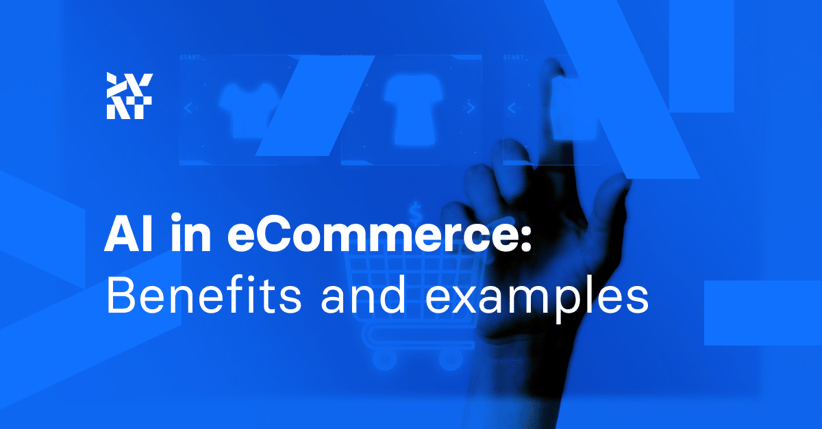Whenever we hear the words “artificial intelligence (AI),” the very first thing that comes to our mind is a crazy plot device usually featured in science fiction movies and novels. However, when it comes to the eCommerce industry, AI revolves around the concept of algorithms and learning technologies that provide the foundation for automation and so much more.
AI is beneficial for today's online retailers to deliver an outstanding customer and user experience in eCommerce and make intelligent business decisions by using customer data. In this article, we’ve shared practical yet powerful ways AI and eCommerce can work together in the online shopping space.
How is AI changing the eCommerce industry?
AI is implanting itself into all aspects of our lives. From the emerging number of self-checkout cash registers to security checks at the airport, AI is almost everywhere. A report published by Gartner stated that, in the last four years, the number of businesses fostering AI increased by 270%. Still, there are plenty of misconceptions about all things related to AI. For example, many assume that AI is a comparatively new branch of study when it's actually nearly 70 years old.
It’s crucial for a business to have an eCommerce platform to be able to compete with other retail businesses. If your eCommerce business isn’t able to sell online, you won’t be maximizing your revenue. On top of that, eCommerce businesses have seen an upward surge after the pandemic. The revolutionary and transformative use of technology has led us into an era where we are immersed in social media, gadgets, and the internet as we’ve never been before. For all of those reasons, many successful businesses have decided to embrace the online market and are seeking opportunities to improve sales in this way.
With many brick-and-mortar businesses wanting to enter the eCommerce arena, AI is becoming a substantial part of the business world. It’s also boosting engagement and interaction with digital touchpoints. We’re witnessing firsthand that implementing AI for eCommerce websites can boost your sales and improve your efficiency and productivity in operations.
Top 5 benefits of AI in eCommerce for your business
A survey by HubSpot stated that 63% of clients don’t even know that they use AI technologies. This shows that you can deploy AI for your eCommerce site indirectly or without even really knowing it. Here are the top five benefits of implementing AI solutions for eCommerce with examples:
1. Voice commerce and virtual assistants
eCommerce virtual assistants (VAs) are chatbots that use language processing and machine learning technologies to understand customer queries and offer the needed support accordingly. This is not new to us anymore. We’re all well versed with Google Assistant, Amazon's Alexa, and Apple’s Siri. eCommerce businesses prioritize using virtual assistants because they’re active 24/7 and can handle queries effortlessly. Importantly, this improves a business’s scalability, too. Virtual assistants can perform several tasks ranging from product research to listing to handling inventory. For customers, VAs represent easy and quick access to information and assistance.
Voice technology is not new either. Businesses have been using it since the 1960s. Still, voice commerce has had remarkable growth. It’s essentially a technology that permits users to buy or do searches with their voices. Voice commerce is preferred by many for its speed and convenience because users don’t have to type anything to search.
2. Smart search
Many customers use the search box to find products on an eCommerce website. It should go without saying that these customers are most likely to make a purchase compared to those who are only “window shopping.” Finding the actual desired item is the biggest problem here. For many, even after using relevant keywords, they often don't find what they’re looking for.
Smart search is also referred to as “searchandizing.” It’s a combination of merchandising and search. It blends merchandising techniques with online search practices. Searchandizing involves advanced elements, like, for instance, faceted search, navigation, autocomplete, recommended product listings, recent searches, and many other features that are merged with established search techniques. eCommerce platforms use image annotation to offer personalized, user-friendly, and useful search experiences through behavioral data.
3. Personalization
Personalization in the eCommerce industry is remodeling the shopping experience according to an individual customer's pain points, needs, preferences, and tastes. For example, they can show recently viewed products, run an automated personalized email campaign, or create a personalized product list.
We can also translate it as the strategy of personalizing the online shopping experience by dynamically or actively showing content, whether it be campaigns, brands, or products, to customers. This depends on their click-through, browsing behavior, purchase history, etc.
Personalization was a part of the industry long before the implementation of AI-powered eCommerce. However, now, computers can now crunch big bites of data that enable optimization and real-time analytics. eCommerce stores have hundreds of thousands of products and, correspondingly, many, many customers regularly.
Software or an algorithm can quickly analyze the data on the spot and fetch trends in customer behavior. With personalized product recommendations, AI eCommerce stores can benefit from customers' inclination to impulse buy. You can also cross-sell or upsell products by recommending different products to the customers at the checkout depending on their preferred brands and categories.
4. Automation
Online stores are now available on multiple channels with 24/7 availability. This often requires some form of automation. By automating customer support, merchants can save time, energy, and operating capital. AI can be of great help when it comes to automation for eCommerce business owners.
With automation, an eCommerce business can manage and execute all repetitive tasks and simplify the front and back-end workflow. With AI, eCommerce businesses can automate everything from featuring new products on multiple channels to synchronizing sales, identifying high-risk transactions, offering discounts to loyal customers, etc. Additionally, shifting the burden of answering routine queries to automated chatbots allows eCommerce business owners to focus on more complicated requests.
5. Remarketing to potential prospects
Remarketing is more like a reminder of an eCommerce business brand and its items to the target audience. A retargeting strategy aims to reach users who are already your customers or those who have previously visited your website. These customers might have already bought from you in the past or they might have left their buying journey at some point before completing a purchase.
With the use of AI in eCommerce, online businesses can identify the behavioral pattern of every customer on the basis of sales generated and the most viewed or purchased items. This data can be used later to attract them back to your eCommerce website. Push notifications are the most powerful retargeting strategy here. These notifications are brief and straightforward, so there's little risk of customers getting annoyed. An eCommerce business can also use personalized push notifications that provide one-on-one communication.
Businesses use AI in their remarketing campaigns as a cost-effective and helpful strategy. Remarketing places your business at the forefront of the customer's priorities. So, next time they surf the internet for shopping, your name will be one of the first to pop into their head.
How is AI changing eCommerce?
Artificial intelligence is constantly transforming the eCommerce industry. Today, it's impacting how an eCommerce store features and sells products to its customers. By offering a highly personalized shopping experience with the help of virtual buying assistants, AI is improving the online shopping experience for both customers and retailers.
The technology also offers advanced ways to identify customers' behavior and analyze big data to help eCommerce stores engage, segment, and retarget their customers. Pulling off a highly personalized customer experience is key to the prosperity of an online business. AI applications can identify and analyze consumer data to forecast future purchasing patterns and make product recommendations depending on the browsing patterns of the consumers.
According to a rough calculation, a report by "Business insider" stated that nearly 85% of customer interactions would be managed without a human by 2020. With emails, phone calls, and chats being efficiently and quickly responded to by automated systems, these stats appear to have been realistic. By 2025, Tractica predicts that the profit generated from the direct and indirect application of AI software will increase up to $59.8 billion.
However, there is still work to be done. According to some recent surveys, up to 85 % of AI initiatives don’t deliver on their promises at the end of the day. Clearly, there are still improvements to be made to AI algorithms, and this number should go down as those improvements become a part of modern AI solutions.
Key takeaways
Ultimately, machine learning and AI will transform the eCommerce industry in the upcoming years, but we can see many examples of artificial intelligence in online shopping already. AI plays an enormous role in adding better customer experiences and innovative solutions in the eCommerce industry. Product recommendations, personalized shopping experiences, virtual assistants, chatbots, and voice search are some of the most distinctive uses of AI in eCommerce. The benefits don't end here. The advantages of gaining insights from customer data collection and then breaking it down can be further enhanced with AI to tailor online merchandising services to the interests and tastes of every customer.
With the help of AI and data collected from customers and businesses, today's eCommerce businesses make informed decisions by using that data more efficiently to forecast future results and adjust their marketing campaigns accordingly.
Published May 24, 2022


.jpg?width=48&name=Melanie-Johnson-478x607%20(1).jpg)

.jpg?width=64&name=Melanie-Johnson-478x607%20(1).jpg)







